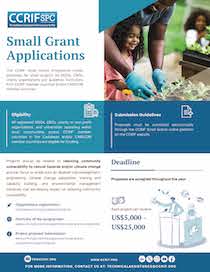June 11, 2008 - The 16 member countries of the Caribbean Catastrophe Risk Insurance Facility (CCRIF) have renewed their 2008 policies, ensuring that they will continue to have immediate access to liquidity if hit by an earthquake or major hurricane.
Domiciled in the Cayman Islands, the CCRIF offers parametrically triggered insurance policies to 16 CARICOM governments. The policies provide immediate liquidity to participating governments when affected by events with a probability of 1 in 15 years or over. Member governments choose how much coverage they need up to an aggregate limit of US$100 million with pricing driven mainly by modeled expected losses.
All CCRIF member countries took advantage of CCRIF's premium price reduction (of 10%) to extend their coverage. Trinidad & Tobago, Grenada and St Kitts & Nevis increased their premium (Trinidad & Tobago significantly so in raising their earthquake coverage to over US$ 90 Million). Many of the countries have also taken advantage of a lower attachment point for hurricane coverage, with six of the sixteen participants choosing an attachment point at the minimum available (1 in 15 years).
CCRIF's risk transfer program for this second season includes a combination of traditional excess of loss reinsurance and a funded cat swap* agreement facilitated by the World Bank to cover the parametric insurance policies issued by the CCRIF. The brokerage firm Benfield Ltd structured the renewed program after being initially appointed as the CCRIF's sole reinsurance broker in February 2007. The program's reinsurer group has been diversified through the inclusion of Swiss Re, in addition to the existing underwriters which include Munich Re (the largest supporter), Paris Re and Hiscox of Lloyd's.
This year's risk financing structure consists of four layers: CCRIF retains the first layer of US$12.5M; re-insurers underwrite the second US$12.5M and third layers US$30M; the top layer US$90M is financed with reinsurance US$60M plus US$30M coverage through a catastrophe swap between the World Bank through the International Bank for Reconstruction and Development (IBRD) and CCRIF.
"CCRIF was able to maintain its excellent support from the reinsurance and capital markets," said Dr Simon Young, CCRIF's Supervisor. The risk transfer program this year was expanded in line with the additional coverage purchased by the participating governments. CCRIF maintains excellent claims-paying capacity through its risk transfer program, access to initial donor funds and its existing capital."
In explaining the importance of the CCRIF Young stated, "Last year saw not only two powerful category 5 hurricanes: Dean and Felix, crossing the Caribbean Sea, but also the largest Caribbean earthquake for 30 years. CCRIF was able to settle claims within two weeks of the event, paying out approximately US$1 Million. Hurricanes Dean and Felix fortunately skirted around island members of CCRIF and showed that the parametric index calculation used is robust."
CCRIF has already improved on last year's policies by allowing countries to access coverage at a lower attachment point. The 2007 season pointed to the need to include rainfall and agriculture losses. The CCRIF is working with regional groups and international reinsurance partners to develop solutions in that direction together with other improvements for the benefit of the Caribbean governments.
Background information on CCRIF:
CCRIF is governed by a board of five directors, nominated by the donor and participating countries. The facility is operated by Caribbean Risk Managers Ltd (CaribRM), a Jamaica, Barbados and US-based risk management consultancy that specialises in developing and implementing innovative risk transfer solutions for public and private sector clients throughout the Caribbean Basin and beyond. Sagicor Insurance Managers (Cayman) is the CCRIF Insurance Managers, ensuring regulatory and governance compliance in the management of the facility.
The CCRIF was established on behalf of the Caribbean Community (CARICOM) heads of government under the guidance of the World Bank with financial support from international donors, including Bermuda, Canada, France, Ireland, Japan, the United Kingdom, the Caribbean Development Bank, and the World Bank. The CCRIF launched in June 2007
CCRIF participating governments are: Anguilla, Antigua & Barbuda, Bahamas, Barbados, Belize, Bermuda, Cayman Islands, Dominica, Grenada, Haiti, Jamaica, St Kitts & Nevis, St Lucia, St Vincent & the Grenadines, Trinidad & Tobago, Turks and Caicos Islands.





